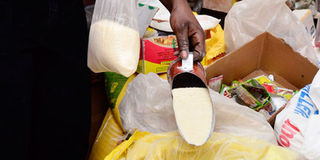URA toughens against sugar, rice re-exports

Smuggled sugar has had an impact on local manufacturers. FILE PHOTO
What you need to know:
- They are usually concealed in jericans or rebagged into brands of the existing bags or even concealed under charcoal or agricultural products.
- Most of the impounded sugar originates from Egypt, Brazil, Mozambique, Thailand, India and South Africa. And impounded rice mostly originates from Pakistan.
Kampala. Uganda Revenue Authority (URA) has issued strong guidelines with the view of curbing the smuggling of sugar and rice.
Mr Dicksons Collins Kateshumbwa, the URA commissioner customs, said in a press briefing that a total of 125 seizures of smuggled sugar were raised from 18 customs stations country wide.
The seizures lead to the recovery of nearly 123,000 kilogrammes of sugar from which a total of Shs712m worth of taxes was collected.
He also disclosed that a total of 213 seizure of smuggled rice were made at 20 custom points, leading to a recovery of nearly 191,000 kilogrammes with of Shs807m in uncollected in taxes.
Sugar and rice, according to URA, are among the most smuggled commodities.
Mr Kateshumbwa said it is the duty of URA to facilitate trade as well as protect the economy from smugglers.
“From today onwards, all re-exports of sugar, rice, wheat flour and cooking oil will be accompanied by a valid sales agreement. We will also need to see evidence that you have paid taxes for the commodities,” he said, adding: “We also want a bond in terms of bank guarantees and all these products will be under electronic tracking, with the exporter taking responsibility in case the seals are tampered with.”
Re-exports of such commodities headed to DR Congo will be required to produce Tax Identification Numbers (TIN) while those re-exporting to South Sudan will be required to make available copies of their business registration documents.
Mr Kateshumbwa emphasised that smugglers are economic saboteurs thus laws must be used to regulate re-exports even when it means there will be occasional delays and inconveniences.
Ms Agnes Nabwire Asobola, the URA assistant commissioner enforcement, said the dodgy nature in which smuggled goods end up in the country is a tale-tell sign of how dangerous and hazardous they could be.
Re-exports, according to URA spokesperson Vincent Seruma, must be critically regulated because many hazardous goods enter the country before they are re-exported to other countries.
Mr Wilberforce Mubiru, the Uganda Sugar Manufacturers Association secretary, said smuggled sugar is dangerous to the local sugar industry as it has the potential to distort prices and production capacity.
“Smuggled sugar tends to be cheaper. So on the basis of price alone we cannot compete with them. We have enough sugar here [so smugglers must be] eliminated,” he said.
Smuggled goods
Most smuggled goods in the last three months according to URA included sugar, rice, cooking oil and wheat flour.
They are usually concealed in jericans or rebagged into brands of the existing bags or even concealed under charcoal or agricultural products.
Most of the impounded sugar originates from Egypt, Brazil, Mozambique, Thailand, India and South Africa. And impounded rice mostly originates from Pakistan.




